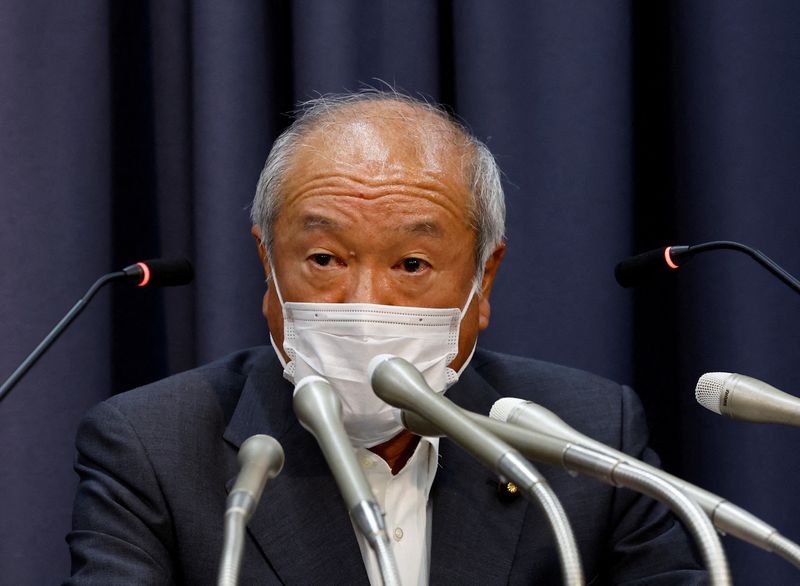By Tetsushi Kajimoto and Leika Kihara
TOKYO/OSAKA (Reuters) -Japanese Finance Minister Shunichi Suzuki said authorities stood ready to respond to speculative currency moves, a fresh warning that comes days after Tokyo intervened in the foreign exchange market to stem yen falls for the first time in more than two decades.
Suzuki also told a news conference on Monday the government and the Bank of Japan (BOJ) were on the same page in sharing concerns about the currency's sharp declines.
"We are deeply concerned about recent rapid and one-sided market moves driven in part by speculative trading," Suzuki told the news conference. "There's no change to our stance of being ready to respond as needed" to such moves, he added.
Japan likely spent a record around 3.6 trillion yen ($25 billion) last Thursday in its first dollar-selling, yen-buying intervention in 24 years to stem the currency's sharp weakening, according to estimates by Tokyo money market brokerage firms.
BOJ Governor Haruhiko Kuroda said on Monday the central bank was likely to retain its ultra-loose monetary policy for the time being, but added that its commitment to keep interest rates at "present or lower levels" may not necessary stay unchanged for years.
At last week's news conference, Kuroda had said the BOJ was unlikely to change its guidance on interest rates for "two to three years".
But on Monday he retracted that.
"It won't be that long, such as two to three years," Kuroda told a briefing in Osaka, western Japan, signalling that the guidance could change depending on how long the economy took to fully emerge from the effects of the COVID-19 pandemic.
Still, Kuroda warned of heightening risks to Japan's economy and stressed his resolve to maintain the ultra-low rates blamed by analysts for accelerating the Japanese currency's declines.
"If risks to the economy materialise, we will obviously take various monetary easing steps without hesitation as needed," he told a meeting with business executives in Osaka, western Japan.
The remarks came after the government's decision on Thursday to intervene in the currency market to stem yen weakness by selling dollars and buying yen for the first time since 1998. Analysts, however, doubted whether the move would halt the yen's prolonged slide for long.
Kuroda said the government's intervention was an appropriate move to deal with "rapid, one-sided" yen moves. He countered the view Japan was chasing contradictory goals by propping up the yen with intervention, while helping drive down the currency by maintaining ultra-low interest rates.
"Monetary policy and currency policy have different goals and effects," he said.
BOJ POLICY CONUNDRUM
The yen's recent sharp declines, which have pushed up households' living costs by boosting imported fuel and food prices, have been driven in part by widening divergence between the U.S. Federal Reserve's aggressive monetary tightening and the BOJ's ultra-loose monetary policy.
The dollar added 0.54% to 144.175 yen on Monday, continuing its climb back towards Thursday's 24-year peak of 145.90. It tumbled to 140.31 that same day after Japanese authorities stepped into the market.
In a meeting Kuroda held with business executives in Osaka, Masayoshi Matsumoto, head of the region's business lobby Kansai Economic Federation, praised Japan's decision to intervene in the market.
"It was a meaningful move that showed Japan's determination it won't leave unattended sharp market volatility," he said.
Yoshihisa Suzuki, an executive of trading house Itochu Corp, called on the BOJ to adopt a "balanced" policy approach that took into account not just the demerits of a weak yen but the potential risks of a sharp yen rise that hurt exports.
"People talk a lot about the demerits of a weak yen. But a strong yen is also painful," Suzuki said.
While government officials' jawboning may keep markets nervous of the prospects of further intervention, stepping in repeatedly in the currency market and selling huge sums of dollars could be difficult due to the criticism Japan may face from its G7 counterparts.
The U.S. Treasury Department said last week it "understood" Japan's intervention was aimed at reducing volatility, but stopped short of endorsing the move.
"It's unlikely Japan will continue intervening to defend a certain line, such as 145 yen to the dollar," former top Japanese currency diplomat Naoyuki Shinohara told Reuters.
($1 = 144.1800 yen)
